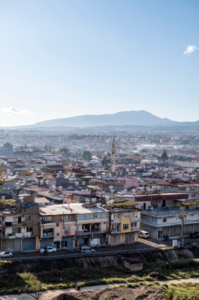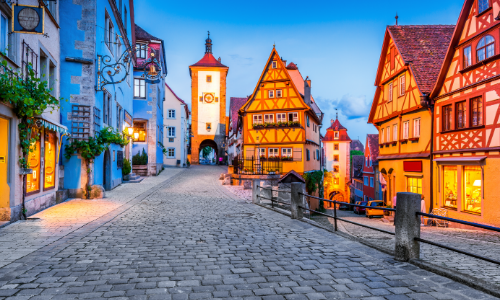I was leaving home to go to the bus station. In 20 minutes, I would be at the station and would board the bus at 12:00. How could I have known that it would be like a slow-motion scene from a movie, and I would miss the bus? There had been a malfunction on the tram line I had taken on my way to the station. We were stuck in this steel behemoth that had come to a halt in a rural area, with doors that wouldn’t open. An announcement had been made, telling us to wait, as if we had anywhere to go! Almost half an hour later, the tram finally moved and I arrived at the station half an hour later than planned. Maybe the bus would also be delayed, I hoped, but it wasn’t meant to be. I immediately started looking for a seat on the next bus. The bus was scheduled for 2:00 PM. There was only one seat left, and despite its triple price, I quickly tried to grab it. I muttered to myself, lips quivering slightly, “Well, what’s this? Did everyone hear about the program in Amsterdam or what!”
My waiting time had extended by two hours. I wanted to wander around and sip a warm coffee since I had experienced tense moments. Even though it was the beginning of March, the weather was freezing, but I didn’t want to miss the bus again. I quickly returned to the platform. It had only been an hour since I returned when I received a message that my bus would be delayed by almost 40 minutes. I looked around as if someone was playing a camera prank. I understood; everything was going to proceed in slow motion today. I thought to myself, “There must be a silver lining,” and continued to wait. The anticipated moment arrived, and the bus appeared on the horizon. Even though I couldn’t see the bus driver, I had mentally thrown red roses in his direction! I took my seat and took a deep breath. I had thought that the seat was three times its normal price due to last-minute booking, but I now realized another reason. I was sitting in the front seat of the double-decker bus. It felt like I was driving the bus along with the driver! Watching the surroundings from the high and wide window was occasionally eerie, but I had grown to enjoy it at times.
I would be in Amsterdam in seven and a half hours. While I sometimes had to put aside my reading due to motion sickness, I’m someone who loves reading books during journeys. I reached for my bag at my feet and took out my book. There are some books that you want to read again and carry with you, even if you’ve already read them. The book I had in my hand was one of those. It had great spiritual value to me. It felt like I was traveling with my father when I held that book. As I started flipping through the pages, it was as if I was moving through ages. On the other hand, the inscription Antakya: A Gift from Abu Ubayda ibn Jarrah, on the thick cover page reminded me of the recent earthquake in Turkey. How could I forget! The content of the book was about Antakya and its history. Who knows what this city had seen and experienced over the centuries! Even if this beautiful city remained under the rubble of collapsed buildings, it would stay in my memories like a bride in a wedding gown.

Located on the banks of the Orontes River, at an altitude of 440 meters above sea level at the foot of Mount Habibunneccar, Antakya stands out as one of the largest cities in the Mediterranean basin during the Byzantine Empire era, a place where Olympic games were held, a densely populated city with massive 12-kilometer-long walls, an important trade and industrial center. It is said that the city is referred to as “qarya” and “medina” in the Qur’an (Al-Kahf, 18:77, 82; Ya-Sin 36:13, 20). The name of the city, known as Antiochia in the pre-Islamic period, has transformed into Antakiye in the Islamic era.[1]
Abu Ubayda ibn Jarrah, may God be pleased with him, captured this city, which had opened its heart to many civilizations, through peaceful means. In fact, Prophet Muhammad, peace and blessings be upon him, had given this blessed companion the good news of this conquest in his dream. The noble Prophet said, “O Abu Ubayda! I give you glad tidings with the pleasure and mercy of God. Tomorrow, Antakya will be conquered through peace. The great commanders of the city and their followers will come to you in groups.”[2] The next day, the city surrendered[3] on the condition that the people pay 1 dinar and 1 jarib (a measure of grain) as jizya.[4] Following this, Commander Pelantanus came to Abu Ubayda and expressed his desire to become a Muslim.[5]

From time to time, it felt as if I was experiencing a space-time jump, going back and forth between the bus and Antakya through the bus window. On a journey from a city in Germany to the capital of the Netherlands, Amsterdam, with no customs control, I was once again realizing the value of peace and tranquility. What kind of responsibilities did we have to fulfill in order to achieve this peace? Perhaps it could start with connecting with open-hearted souls at a seminar in Amsterdam! As the sun slowly drifted to sleep, giving way to darkness, I also put my book back in my bag. In this journey that heralded spring with every letter and word, I waved to the future through the window, slowly but joyfully.
[1] “Antakya”, TDV İslâm Ansiklopedisi.
[2] Muammer Türk, Ebu Ubeyde bin Cerrah’ın (r.a.) Hediyesi Antakya, Hatay: Akadim Kültür Yayınları, 2013, p. 114–115.
[3] “Antakya”, TDV İslâm Ansiklopedisi.
[4] The tax of protection and exemption from military service which non-Muslim citizens of a Muslim state are required to pay.
[5] Türk, ibid. p. 115.




